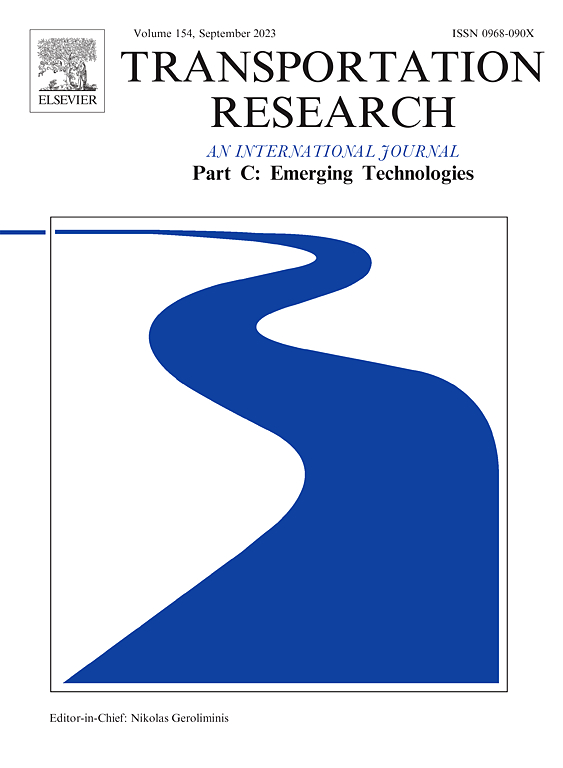Adaptive and flexible rail transit network service dispatching as a partially observable Markov decision process
IF 7.6
1区 工程技术
Q1 TRANSPORTATION SCIENCE & TECHNOLOGY
Transportation Research Part C-Emerging Technologies
Pub Date : 2025-08-05
DOI:10.1016/j.trc.2025.105286
引用次数: 0
Abstract
This paper presents a novel adaptive train scheduling framework with flexible fleet sizes for routing and scheduling in network-wide rail transit services. This framework aims to minimize both passenger waiting times and operating costs driven by prevailing passenger demand. The train scheduling problem is formulated as a partially observable Markov decision process (POMDP) to reflect the practicality in training and real-world applications. To address the computational challenges associated with the train scheduling problem, deep reinforcement learning techniques are applied to seek potential optimal solutions to the optimization problem. The proposed train scheduling framework is tested using real-world scenarios and the data collected from the Hong Kong Light Rail Transit (LRT) network. The experiment results demonstrate that the proposed train scheduling framework using flexible fleet sizes can effectively reduce passenger waiting time and operating costs. This study contributes to the real-time routing and scheduling of network-wide rail transit services by advanced optimization technology.
作为部分可观察马尔可夫决策过程的自适应柔性轨道交通网络服务调度
本文提出了一种新的具有灵活车队规模的自适应列车调度框架,用于全网轨道交通业务的路线和调度。这一架构的目的是尽量减少乘客的轮候时间和营运成本。列车调度问题被表述为部分可观察马尔可夫决策过程(POMDP),以反映训练和实际应用中的实用性。为了解决与列车调度问题相关的计算挑战,应用深度强化学习技术寻求优化问题的潜在最优解。建议的列车调度框架是使用真实场景和香港轻铁网络收集的数据进行测试的。实验结果表明,采用灵活机队规模的列车调度框架可以有效地减少乘客等待时间和运营成本。本研究为利用先进的优化技术实现全网轨道交通服务的实时路由调度做出了贡献。
本文章由计算机程序翻译,如有差异,请以英文原文为准。
求助全文
约1分钟内获得全文
求助全文
来源期刊
CiteScore
15.80
自引率
12.00%
发文量
332
审稿时长
64 days
期刊介绍:
Transportation Research: Part C (TR_C) is dedicated to showcasing high-quality, scholarly research that delves into the development, applications, and implications of transportation systems and emerging technologies. Our focus lies not solely on individual technologies, but rather on their broader implications for the planning, design, operation, control, maintenance, and rehabilitation of transportation systems, services, and components. In essence, the intellectual core of the journal revolves around the transportation aspect rather than the technology itself. We actively encourage the integration of quantitative methods from diverse fields such as operations research, control systems, complex networks, computer science, and artificial intelligence. Join us in exploring the intersection of transportation systems and emerging technologies to drive innovation and progress in the field.

 求助内容:
求助内容: 应助结果提醒方式:
应助结果提醒方式:


